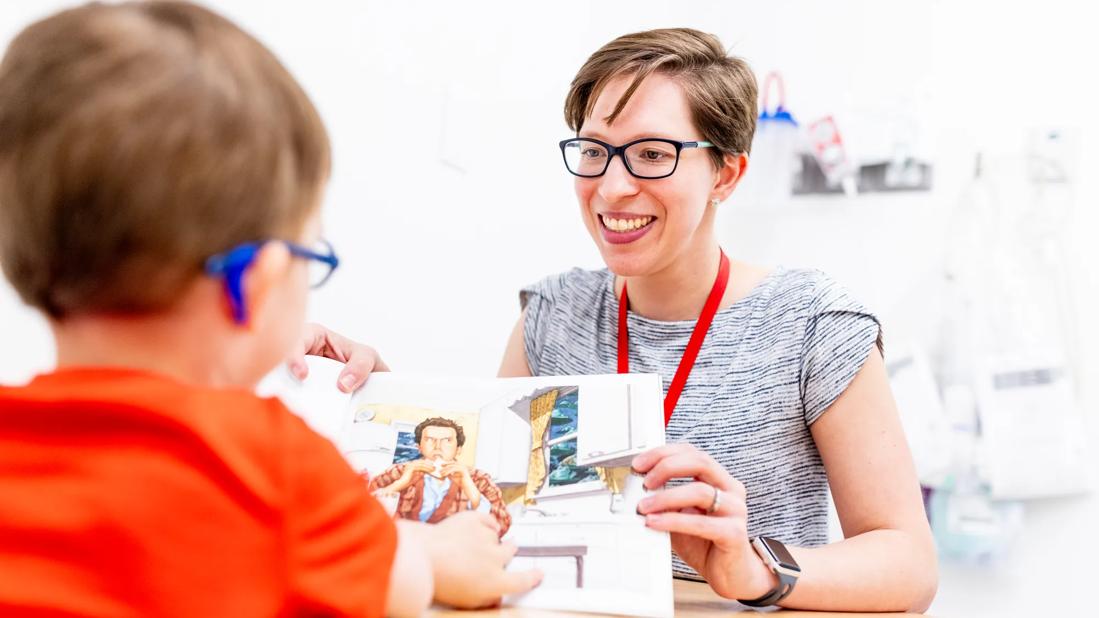Specialized clinic provides comprehensive care for pediatric patients with a high-risk history

Image content: This image is available to view online.
View image online (https://assets.clevelandclinic.org/transform/491277ae-4646-4b24-bb7a-d1f1c7b0f85c/CHP_4959158_06-28-24_010_LDJ)
Dr. Cuffman reading book with young patient
NICU babies who were born extremely preterm or with certain neonatal complications carry an increased risk of developing neurodevelopmental issues later in life.
Advertisement
Cleveland Clinic is a non-profit academic medical center. Advertising on our site helps support our mission. We do not endorse non-Cleveland Clinic products or services. Policy
These issues may include delays in gross and fine motor skills, speech and language delays, behavioral challenges, such as anxiety, ADHD, and executive functioning difficulties, and a higher risk of autism, explains Carrie Cuffman, MD, a developmental pediatrician.
Neonatologists at Cleveland Clinic oversee a NICU Follow-up Program that provides ongoing monitoring and support for patients who have graduated from the NICU. However, many of these patients age out of the program before their third birthday.
That's where the NICU Neurodevelopmental Support Program comes in, says Dr. Cuffman. It addresses a critical gap in care by transitioning patients with the highest risk for neurodevelopmental issues from neonatology to developmental pediatrics.
Dr. Cuffman evaluates patients in the program for developmental and behavioral concerns and provides a bridge to medical specialists and therapists within the healthcare system for further assessment and intervention.
"The goal of the program is to take over neurodevelopmental care for children and teens who were born preterm and have high-risk factors but are no longer eligible for formal NICU follow-up care or management by a neonatologist," notes Dr. Cuffman.
Those born before 28 weeks of gestation or weighing 1,000 grams or less tend to make up the bulk of the patients in the program, but other risk factors don't meet traditional criteria. Dr. Cuffman elaborates, "This may include neonatal complications with neurological involvement, like intraventricular hemorrhage or hypoxic-ischemic encephalopathy, genetic syndromes, certain medical complications or prolonged hospitalization, as examples."
Advertisement
The notion of specialized care for this patient population is not in itself unique, but a dedicated home that provides an on-ramp for individualized care is a novel concept.
"In most centers, these patients are likely managed by general developmental pediatricians, or they are sent back to their primary care physician who monitors their development, but there's not a specific clinic," explains Dr. Cuffman.
An educational advocate also staffs the center. They are trained to liaise between medical and educational teams to ensure patients have access to appropriate tools and resources.
Being able to "speak both languages" by translating medical issues in the context of an educational setting is essential, Dr. Cuffman stresses. Educational advocates also help patients and families navigate the Individualized Education Program (IEP) process, even attending IEP meetings with families as needed.
In addition to a developmental pediatrician and educational advocate, a speech-language pathologist, physical therapist and social worker round out the team to provide comprehensive, multidisciplinary developmental care. For older patients, a neuropsychologist is available on consultation.
While many patients transition into the NICU Neurodevelopmental Support Program following regular care in the NICU Follow-up Clinic, Dr. Cuffman encourages primary care physicians to consider the program for children who have been lost to follow-up, even if they are well beyond the NICU stage.
While developmental issues, like motor control and sensory concerns, may present in early childhood, cognitive delays, like learning disabilities, may become more pronounced later in life. Unexplained issues in high-risk patients could be a clue that these patients require neurodevelopmental support.
Advertisement
"If a provider sees an adolescent or teenager who is having issues developmentally and they were born preterm or have any other risk factors, we encourage them to consider this program. We can work with them and their family to identify the right services and support," Dr. Cuffman concludes.
Advertisement
Advertisement
Research aims to understand factors to help standardize practices
Specialists in the growing specialty are well-positioned to foster seamless, high-value care
Programs bring age- and size-appropriate technology to children
Physician shares key considerations and other resources
Program has facilitated nearly 300 consults across 25 departments in less than a year
Quality improvement project addresses unplanned extubation
Following an international call for proposals, experts ranked the following proposals
How one simple project changed the conversation about care and the patient-parental experience